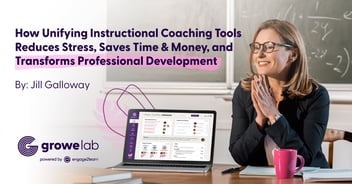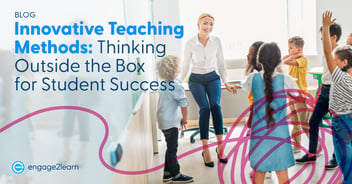What Instructional Coaching Is and Is Not: Dispelling Common Myths
As the field of education continues to evolve, instructional coaching has emerged as a powerful tool for professional growth and development among educators. However, despite its increasing popularity, there are still misconceptions surrounding what instructional coaching truly entails. This article aims to shed light on the essence of what instructional coaching is and is not. By understanding its purpose and distinguishing it from other forms of support, educators can fully leverage coaching to enhance their teaching practice and foster student success.
What is Instructional Coaching?
Instructional coaching is a collaborative partnership between an educator who has received training in coaching and an educator. Coaching can occur one-on-one or in a professional learning community (PLC). It is a supportive relationship based on trust, mutual respect, and a shared commitment to improving instructional practices. During the instructional coaching cycle, the coach serves as a guide, sounding board, and thought partner to help the educator reflect on their teaching methods and develop targeted strategies for growth.
Individualized Professional Development
Personalized coaching for instruction is tailored to the unique needs of each educator. The coach works closely with the educator to identify areas of improvement, set goals, and design actionable plans for implementation. Coaching sessions focus on specific instructional practices, pedagogical approaches, and classroom management strategies, fostering continuous growth and refinement.
Reflective Practice
Teacher coaching encourages educators to engage in reflective practice, examining their teaching methods, beliefs, and assumptions. Through thought-provoking conversations and inquiry-based questioning, coaches help educators gain new insights, challenge existing practices, and explore innovative approaches. The emphasis is on self-reflection, self-awareness, and a commitment to ongoing improvement.
Data-Informed Feedback
Coaching utilizes data to provide meaningful feedback to educators. Coaches analyze student data, observation notes, and other relevant metrics to help educators identify strengths, areas for growth, and potential instructional adjustments. This data-driven instruction approach allows educators to make informed decisions and implement evidence-based strategies to maximize student learning outcomes.
What Instructional Coaching Is Not
In some school districts, instructional coaching is relegated to teacher evaluation based on classroom evaluations. Instructional coaching is not intended to be a judgmental or evaluative process. Coaches focus on growth and improvement rather than rating or ranking educators. The coaching relationship is built on trust, confidentiality, and a non-threatening environment, enabling educators to openly explore their challenges and take risks without fear of negative consequences.
RELATED: 3 Misconceptions About Instructional Coaching
Remedial Intervention
Coaching for educators is not a remedial “how to coach a struggling teacher” solution. It is not meant to "fix" teachers, but rather to support their continuous growth and development. Coaches work with educators at all levels of proficiency, acknowledging their strengths and helping them build upon those strengths to enhance their instructional practice.
One-Size-Fits-All Solution
Coaching for instructors is not a one-size-fits-all solution for professional development. It recognizes that each educator is unique, with different strengths, needs, and goals. Coaches adapt their coaching approach to meet the specific requirements of each individual, providing personalized support and guidance tailored to their context and aspirations.
Quick-Fix Solution
Instructional coaching is a process that unfolds over time. It is not a quick-fix solution or a one-time workshop. The coaching journey is ongoing, allowing educators to engage in continuous learning and reflection. Through regular coaching sessions, educators can deepen their understanding, refine their practices, and sustain meaningful growth in their teaching.
Professional Development for Teachers: GroweLab
engage2learn (e2L) is the leading K-12 talent development partner for public schools nationwide, known as innovators in instructional coaching and professional development. We've been hard at work designing a revolutionary, all-in-one talent development and instructional coaching platform in place of the eSuite platform that our partners currently use.
GroweLab, which will launch July 2023, is an individualized instructional coaching platform designed to transform professional development and enable school and district leaders to better support educators and staff, increase retention, accelerate student outcomes, and transform school culture. The platform includes the following solutions, features, and benefits:
- Cost and Resource Savings
Instead of investing in multiple platforms, a single, comprehensive platform can result in substantial cost savings, thanks to lower per-user license fees, reduced maintenance costs, efficient implementation, and minimized opportunity costs. - Simple and Efficient
GroweLab allows coaches to manage large rosters of teachers, track all instructional coaching conversations, and easily document classroom observations in a simplified, streamlined interface. - Professional Growth Opportunities
GroweLab enables educators and staff to earn microcredentials as recognition for the skills and competencies they develop, helping them expand their expertise and build their professional portfolios. - Personalized Learning
GroweLab provides educators with 24/7 access to asynchronous, competency-based learning through a robust resource library and professional development courses for teachers online. - Career Advancement Support
GroweLab empowers instructional and non-instructional staff to grow and provide evidence of growth in proven professional learning competencies, which can be customized by role, school, or from scratch with the platform’s competency builder. - Differentiated and Personalized Support
GroweLab grows individuals at their own pace or through real-time coaching interactions and feedback to cater to different learning styles, preferences, and schedules. - Improved Data Integration and Analysis
Education analytics provides ongoing coaching and talent development efforts, giving leaders access to coaching activity and progress, connecting teacher growth data to student outcomes data, and measuring the ROI of coaching. - Consistent and Timely Communication
GroweLab tightens the communication loop between teachers and instructional coaches by automating manual tasks to increase efficiency and capacity, leading to improved instructional practice and student outcomes.
Instructional coaching holds tremendous potential for transforming teaching practices, fostering professional growth among educators, and treating teachers as the talent they are. At e2L, we know that instructional coaching empowers educators to become lifelong learners, cultivators of innovation, and champions of student success. By dispelling misconceptions and understanding what instructional coaching truly is, educators can embrace this collaborative and personalized approach to enhance their instructional strategies and ultimately improve student outcomes.
Ready to experience the transformative impact of GroweLab across your school or district? Learn more and get a demo here!



